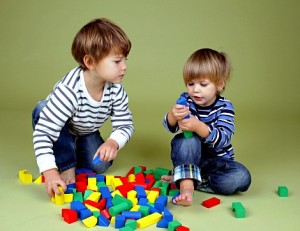 When young children have poor language skills, their peers tend to exclude them from social play. This finding comes from data gathered in the University of Stavanger’s Stavanger Project – The Learning Child, a longitudinal study following a cohort of Norwegian children beginning at age 2.5 years. The researchers suggest that children who fall behind in language early on may struggle to catch up as they find themselves left out of play or relegated to minor roles in games or role plays. The results indicate that early language skills have broad effects for young children.
When young children have poor language skills, their peers tend to exclude them from social play. This finding comes from data gathered in the University of Stavanger’s Stavanger Project – The Learning Child, a longitudinal study following a cohort of Norwegian children beginning at age 2.5 years. The researchers suggest that children who fall behind in language early on may struggle to catch up as they find themselves left out of play or relegated to minor roles in games or role plays. The results indicate that early language skills have broad effects for young children.
The researchers gathered data on over 1,000 children from the Stavanger Project. They analyzed data from when the children in the study were aged two years and nine months. Then they examined the relationship between language and social skills in the children.
The data demonstrate a major difference between the 10 percent of children with the weakest language skills and the rest of the peer group. Only 11 percent of two-year-olds with poor language skills were able to play well with others. In contrast, 70 percent of two-year-olds with typical language development played well with other children. When children are excluded from play, they miss out on social experiences that promote language development.
“Our research shows that children with language difficulties struggle socially and that this persists into secondary school,” explained Elisabeth Brekke Stangeland, Ph.D. student, who conducted the study. “Play requires a good grasp of language. Even children under the age of three years use language when playing and it is essential that children understand each other in the process.”
According to other studies, this effect may persist in older children. One study demonstrated that five-year-olds with language difficulties are ignored by peers and that their peers are less responsive to them.
The researchers say that the findings offer a call to action for adults working with young children. When children with weaker language skills are excluded from play, adults should step in to help the children be included and, hopefully, develop social and language abilities.
This research was presented during the Stavanger Project’s annual research gathering.
Previous news in language:

